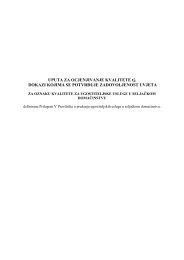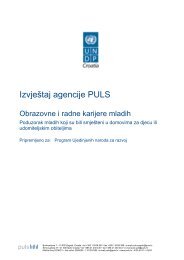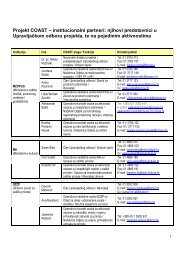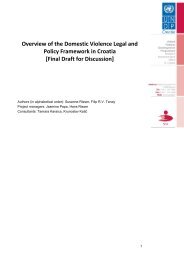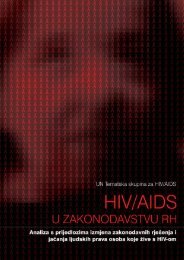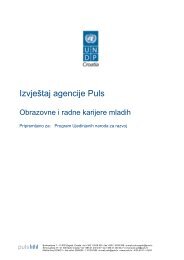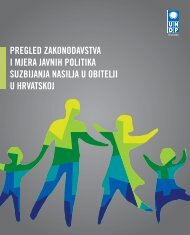WEB engleska verzija end.indd - UNDP Croatia
WEB engleska verzija end.indd - UNDP Croatia
WEB engleska verzija end.indd - UNDP Croatia
- No tags were found...
Create successful ePaper yourself
Turn your PDF publications into a flip-book with our unique Google optimized e-Paper software.
CHAPTER 3THE SOCIALLY EXCLUDED3.15 People with Dep<strong>end</strong>ency ProblemsBox 22: Growing up in a family with alcoholicparents“My father and my mother were serious alcoholics.My father would drink a bottle of hard liquor a day,but he handled it pretty well. My mother woulddrink to the point of collapsing. When my motherwas drunk in the house, there would regularly bescreaming and fighting; she acted in a sexuallydeviant manner and sometimes tried to abuse mesexually. I remember that once my father beat herup after she kept trying to get into my bed.As the eldest child in a family with alcoholic parents,I had to grow up fast and assume responsibility formyself, my brothers, and our household. My taskwas to cheer up dad, so that he wouldn’t yell atour drunken mother, or start drinking himself andsmashing things around the house, beating us, aswell. I was born old. I don’t remember ever havinga childhood or youth.”3.15.1 Human RightsAlcohol abusersIt is estimated that 6% of the <strong>Croatia</strong>n populationabuse alcohol. Fifteen percent of the adult malepopulation and 4% of adult females drink excessively.Since a moderate consumption of alcohol is toleratedin <strong>Croatia</strong>n culture, as well as individuals who drinkexcessively, alcoholics are socially assimilated, andtheir human rights are not threatened in a fundamentalsense. However, people who have problemswith excessive drinking t<strong>end</strong> to be responsible for thegreatest number of social deviations, thus directlyjeopardising the rights of others. Their dysfunctionalbehaviour, although having unfavourable effects onthe immediate family and working environment, israrely sanctioned. The immediate responsibility of theMinistries of Justice, the Interior, Healthcare and SocialWelfare is to provide protection to the individualswho share family, working and living environmentswith alcoholics.Users of psychoactive drugsIn the past 15 years, drugs have become more accessible,cheaper and prevailing. Thus, occasional drugusers, who might have remained so in the unorganiseddrug market, have developed an addiction in a shortperiod of time. Similarly, those who have consumedsoft drugs such as marijuana, as well as youth whorecreationally use ecstasy-speed now switch to heroinin a shorter period of time and in greater numbers. Itis now common for individuals to have their first experiencewith drugs between the ages of 14-16, andfor an increasing number of them heroin is the firstdrug of choice. Youth seem to no longer feel drugs aresomething dangerous, prohibited or harmful, so drugsare assuming the role that alcohol use to play. In 2004,the ratio of men to women treated for drug-relatedproblems was 5.2:1 in favour of the male sex. In <strong>Croatia</strong>,the public is extremely sensitised to the problem ofdrug abuse. Numerous institutions have programmesfor helping drug users, which is frequently above thelevel that exists in many developed western countries.The problem of drug abuse is elevated to the level of apolitical and social problem.3.15.2 Access to Healthcare and SocialServicesAlcohol abusersIn <strong>Croatia</strong>, the treatment for alcoholics is at an unsatisfactorylow level. The health system suffers from adeficiency of psychiatrists, physicians, social workers,and pedagogues that are especially trained toprovide help to people with drinking problems. Thegeneral level of knowledge about secondary problemscaused by alcohol abuse is also inefficiently low.Psychiatrists t<strong>end</strong> to feel that dealing with peoplewith drinking problems is not within their scope ofpractice. As a result they t<strong>end</strong> to deal with the issuefrom a moral and not a medical standpoint.The Ministry of Health and Social Welfare is responsiblefor the implementation and control of preventativeprogrammes for alcohol-induced disorders. Withinthe Ministry, the social welfare department plays alarger role than the health department, because in their122



